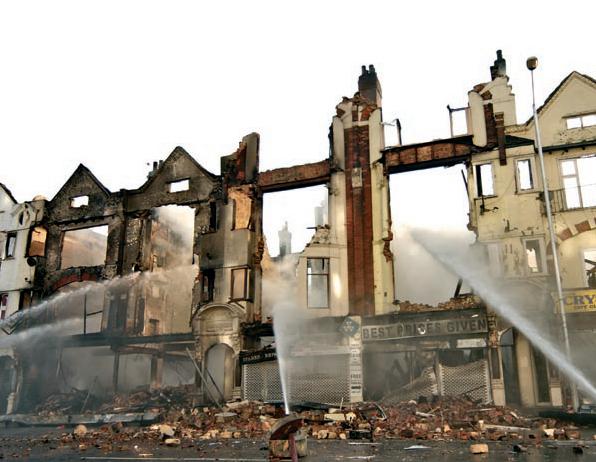
4 minute read
GUIDE TO INSURANCE
from Guide to Insurance
This Guide is designed to assist Freeholders, Landlords and Leaseholders of blocks of flats and their Residents' Management Company (RMC), Right to Manage (RTM), Residents Association (RA) Directors or Committee Members and Property Managing Agents (PMA).
CHECKING YOU HAVE ENOUGH COVER
THE IMPORTANCE OF A CORRECT PROPERTY VALUATION
HOW IS YOUR INSURANCE PREMIUM CALCULATED?
THE DEVIL IS IN THE DETAIL
INDEX LINKING VERSUS DAY ONE
HOW TO MAKE SURE YOUR CLAIMS ARE HANDLED QUICKLY
YOU THOUGHT IT COULD NEVER HAPPEN TO YOU
WATER DAMAGE - ACTIONS TO TAKE
WHO PAYS THE EXCESS?
THE BENEFITS OF USING A SPECIALIST BROKER OR INTERMEDIARY
Whilst the authors, editor and publishers have taken all reasonable care in producing this publication they make no warranty about its accuracy and disclaim all liability arising from its use
Please ensure you obtain the appropriate professional advice in arranging cover suitable to your needs
At Residentsline we are pleased to untangle the confusion to ensure Freeholders, Landlords and Leaseholders of blocks of flats and their Residents' Management Company (RMC), Right to Manage (RTM) or Residents Association (RA), Directors or Committee Members and Property Managing Agents (PMA) understand the insurance requirements of this specialist market and protect themselves by arranging comprehensive cover which also complies with the expectations of the lease, most importantly:
The wrong level of insurance protection can result in great hardship for flat owners.
The wrong level of protection can lead to the personal wealth of Directors being at risk.
Flats owners often have little say in the choice of their Insurer and, as such, the insurance industry needs to provide products and service standards that treat flat owners fairly At the very least, they deserve the same protection as home owners and so we believe it is time for the insurance industry to raise its game
This guide aims to explain some of the issues involved and assist you in making informed decisions.
Is your insurance policy adequate for the needs of your block?
Ensuring your block is adequately covered is a major responsibility and ensuring a competitive price as well as comprehensive protection for property owners can be quite a challenge Policies for blocks of residential flats can contain many different sections and we'll try and demystify them for you!

The Buildings Section
This section covers the actual building itself, which is often referred to as the "bricks and mortar" Cover extends to all areas of the buildings including the individual flats and apartments, although it does not cover the occupants contents as these are the responsibility of your individual residents.
The Buildings Section generally covers you against specific risks A "risk" is something that may happen to the block, such as fire, flood, malicious damage or escape of water and so on Some policies are written on a "Specified Perils" basis which means that the cover the policy provides is limited to the perils listed in the policy
Other policies are written on an "All Risks" basis and by definition the cover provided is wider and covers the known and potentially unknown, not restricted to certain specified perils.
“All Risks” cover is slightly more expensive but is worth seeking out as the level of protection offered is much wider.
Terrorism
Terrorism Insurance covers damage to the buildings caused by an act of Terrorism. It's worth remembering that Terrorism Cover is not automatically included unless you specifically ask for it and pay extra premium to reflect this.
Terrorism is available from a range of insurers which is offered on an all risks basis including damage caused by nuclear, biological, chemical and radiological means. Please note that there are products available in the market place that do not include these extra levels of cover
Whilst this policy extension comes at a cost, it is intended to protect you from your obligations under the lease. If your lease states that you should insure against all normally available insurance perils or provide comprehensive insurance then, by not purchasing this extension of cover, you may be failing to meet the requirements of the lease
Liabilities
Liability Insurance cover can include Public Liability, Employers Liability and Directors and Officers Liability.
Public Liability (sometimes referred to as PL) would provide cover if a visitor to the property was injured after a slip, trip or fall or a resident slipped on a wet floor and suffered injury, then a potential claim for compensation against the policyholder could arise, although it is always worth remembering that the policyholders negligence has to be proven.
Limits of Indemnity range from £1 million to £10 million or more. Whilst a lower figure may appear on first sight to be adequate, consider what amounts a Court may award in the event of permanent disability to several people!
Employers Liability (sometimes referred to as EL) is one of only a handful of compulsory insurances in the UK. In a nutshell it covers your liability as an employer whether the employee be paid or unpaid, full time, part time, or temporary It is considered prudent for an RMC, RTM or RA to hold both EL and PL cover to ensure that "grey areas" are included It is easy in the eyes of the law to be construed as an employer even if this was not your intention; hence this inexpensive extension is a sensible contingent precaution.

If one of your employees was injured whilst carrying out his or her duties then the RMC, RTM or RA as the employer, could be liable Once again the claimant would have to prove that the RMC, RTM or RA was negligent.
The normal Limit of Indemnity is £10 million, which is generally considered to be adequate.
Directors and Officers Liability is a relatively new type of cover in the UK market It protects the individual members of the Management Company or Residents Association against their legal liability following "wrongful acts" arising when carrying out their duties. "Wrongful Acts" are defined in the policy and include alleged breach of duty, negligence, misleading statement and defamation









